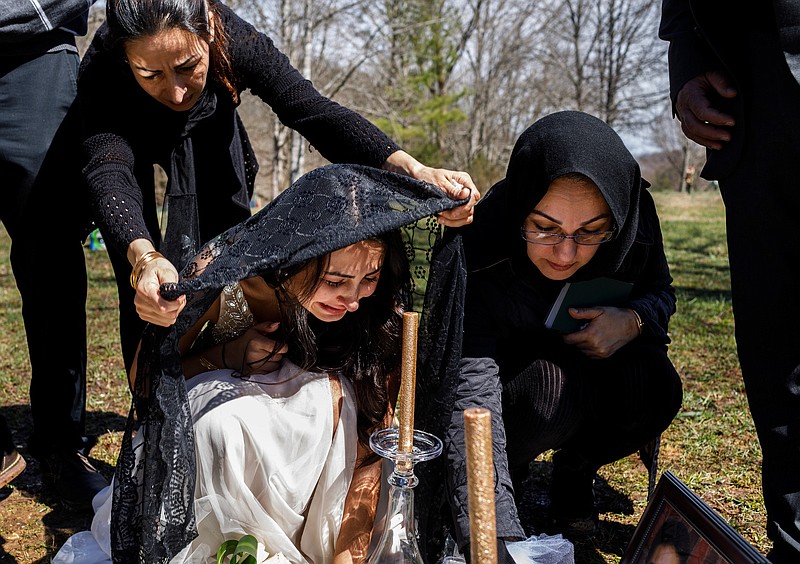The would-be bride knelt and cried beside the grave of her fiancé on Sunday.
On what was to have been their wedding weekend, she wore her ivory chiffon wedding dress. Its sequined bodice glistened in the sun as she sobbed.
The love of Sara Baluch's life, 24-year-old Mohammad Sharifi, didn't live long enough to make the wedding. He was shot and killed about three weeks ago in the parking lot of a Hixson Pike apartment complex while trying to sell his Xbox One gaming system, which he had listed on Facebook Marketplace. A 20-year-old has been charged with criminal homicide and aggravated robbery.
Sharifi's death was one of 83 in Tennessee's 312 shooting incidents this year alone, according to gunviolencearchive.org. In the database, an incident is defined as any shooting - criminal, accidental or suicidal. Nationally, there have been 9,462 incidents - and 2,586 deaths - from Jan. 1 through mid-day Monday.
Imagine the tears shed by people such as Sara Baluch by the end of the year.
In late February, the U.S. House of Representatives passed two gun control measures - the first in two decades.
Congress members passed a bill to require universal background checks on all commercial gun sales, including those at gun shows and online. This measure alone would close loopholes that allow one in five guns to be sold without a completed check. House members also voted on a bill that requires sellers to wait to continue firearm transactions from three to 10 days.
Neither bill is expected to be taken up by the Senate.
"Everybody - 92 percent of the country - believes that we should have background checks, that we should close the gun-show loophole, that we should make sure that people who have mental illness, you're a terrorist, you're a criminal, shouldn't be able to get a gun," Rep. Josh Gottheimer, D-New Jersey, and the co-chairman of the Problem Solvers Caucus, said last week on MSNBC. He noted that if there'd been more than a three-day waiting period, white supremacist Dylann Roof might have been prevented from killing nine black people in a Bible study class in Charleston, South Carolina, in 2015.
The MSNBC host, Stephanie Ruhle, asked: "What do you say to Republicans who say this is not going to do anything to make things safer?"
"Oh, come on. I have yet to have a Republican [in Congress] tell me that. The problem is that it's become so political. That's why the 92 percent is so important. It doesn't mean you can't get a gun, it doesn't mean you can't go hunting."
Clearly most Americans know that. We didn't need to research to tell us that universal background checks would save tens of thousands of lives. We see it and read in the news daily. We see it in our communities. In our cemeteries.
No doubt, Congress knows it, too. But then there's that "p" word: Politics.
Sen. Chris Murphy, D-Connecticut, has been fighting for stronger gun safety measures since first-graders were gunned down at Sandy Hook Elementary School in his state seven years ago.
In a Q&A last week with Rolling Stone, Murphy said the failure of Congress to enact gun safety legislation had never been about public opinion: "This is always been about the political power of the gun industry."
In the years - and the far too many shootings - since, gun safety advocates have worked to change the political landscape. Still, Senate Majority Leader Mitch McConnell has "zero interest" in making Republican senators choose between their constituents and the NRA. Murphy said that's because "the Republican Party and the gun lobby are brother and sister, and it's really hard to break up that historic alliance."
It used to be same in the Democratic party, Murphy acknowledged, but "that's not the case anymore. Our work now is to train the growing power of the anti-gun violence movement on the 10 or 15 [GOP] senators who can change [McConnell's] mind - senators who are up for reelection in 2020 or 2022 and know that being against background checks, or being against a vote on background checks - is really bad politics."
The two House votes last month are groundbreaking. They mark an important mood change.
We hope it's now not just a question of whether universal background checks are going to become law, but more a question of when.

